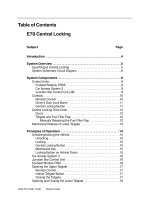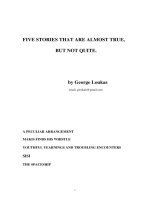Five central issues
Bạn đang xem bản rút gọn của tài liệu. Xem và tải ngay bản đầy đủ của tài liệu tại đây (534.04 KB, 43 trang )
Fossilization:
Five central issues
ZhaoHong Han
Teachers College, Columbia University
SLRF 2002, Toronto, Canada
1
The ultimate goal of second language
acquisition research is to come to an
understanding of what is acquired
_ __________________
(and
what is not acquired)
and the
mechanisms that bring second
language knowledge about.
(Gass, 1988:198; emphasis added)
2
1. Background
2. Definitions and putative causal variables
3. Conceptual issues
4. Major methodological approaches and
issues
5. Some concluding thoughts
3
Background
4
Chien-Shiung Wu
1990
1942
with
her
early
difficulties
speaking idiosyncratic English
with English still
evident
5
One of the most enduring and fascinating
problems confronting researchers of
second language acquisition (SLA) is
whether adults can ever
acquire native-like
competence in a second
language (L2),
6
One of the most enduring and fascinating
problems confronting researchers of
second language acquisition (SLA) is
whether this is an
accomplishment
reserved for children
who start learning at a
relatively early age
(Kellerman, 1995: 219)
7
For most of us the acquisition of second
language is less spectacular. If we are
past the age of around 7-10 years the
acquisition of an L2, in marked contrast
to the way we acquired our first language
(L1), can turn out to be rather slow,
laborious and, even in talented L2
learners, tends to stop short of native-like
proficiency.
8
This "stopping short" has been
referred to as fossilization (Selinker,
1972) or incompleteness (Schachter,
1990). It is one of the noticeable
characteristics of second language
acquisition.
(Towell & Hawkins, 1994:2)
9
Definitions
10
Selinker (1972)
Fossilization
, a, mechanism
… underlies
Fossilization
a mechanism
…
surface
linguistic
material
which
speakers
underlies
surface
linguistic
material
will
tend
to
keep
in
their
IL
productive
which speakers will tend to keep in
performance, no matter what the age of
their IL productive performance,
the learner or the amount of instruction he
receives in the TL.
(Selinker
1972: 229)
11
Selinker (1972)
[F]ossilizable linguistic phenomena are
linguistic items, rules, and sub-systems which
speakers of a particular L1 tend to keep in
their IL relative to a particular TL, no matter
what the age of the learner or amount of
explanation and instruction he receives in the
TL....
(Selinker, 1972: 215)
12
Selinker (1978)
…
cessation
of IL
… aapermanent
permanent
cessation
of learning
IL
before
thebefore
learner the
has learner
attained has
TL norms
at
learning
attained
all
levels
of
linguistic
structure
and
in
all
TL norms at all levels of linguistic
discourse domains in spite of the learner’s
structure and in all discourse domains
positive ability, opportunity, and motivation
to learn and acculturate into target society.
(Selinker &
Lamendella, 1978: 187)
13
Selinker (1996)
[F]ossilization
is the process
process whereby
whereby the
the
learner creates aa cessation
cessation of
of interlanguage
interlanguage
learning, thus stopping
stopping the
the interlanguage
interlanguage
from developing,
developing, itit is
is hypothesized,
hypothesized,in
inaa
permanentThe
wayargument
….
….
is that no adult can
hope to ever speak a second language in
such a way that s/he is indistinguishable
from native speakers of that language.
(Selinker, 1996)
14
Lowther
Fossilization, as presented in much of the
literature, is understood to be theinability
of a person to attain nativelike ability in the
target language.
(Lowther, 1983: 127; emphasis added)
15
Ellis (1985: 48)
Fossilized structures can be realized as
errors or as correct target language forms.
16
Ellis (1985: 48)
Fossilized structures can be realized as
errors or as correct target language forms.
If, when fossilization occurs, the learner has
reached a stage of development in which
feature x in his interlanguage has assumed the
same form as in the target language, then
fossilization of the correct form will occur.
17
Ellis (1985: 48)
Fossilized structures can be realized as
errors or as correct target language forms.
If, however, the learner has reached a stage in
which feature y still does not have the same
form as the target language, the fossilization
will manifest itself as error.
18
Vigil & Oller (1976:282)
[W]e will extend the notion of fossilization
to any case where grammatical rules,
construed in the broadest sense, become
relatively permanently incorporated
into a psychologically real grammar….
19
Vigil & Oller (1976:282)
[A]n adequate explanation must account for
the incorporation of rules into developing
grammars in relatively permanent form
regardless of whether those rules conform
or do not conform to the norms of the
language which is being learned.
20
Vigil & Oller (1976:282)
It
It is
is not
notonly
onlythe
thefossilization
fossilizationofofso-called
so-called
'errors'
bebe
explained,
butbut
alsoalso
the
'errors'that
thatmust
must
explained,
fossilization
of correct
formsforms
that conform
the fossilization
of correct
that
to
the target
language
conform
to the
targetnorms.
language norms.
21
Hyltenstam (1988:68)
Fossilization
-- -according
to observations
-- is a
Fossilization
according
to observations
process
that maythat
occurmay
in theoccur
secondinlanguage
-- is a process
the
acquisition
context
as
opposed
to
first
language
second language acquisition context as
acquisition.
opposed to first language acquisition.
22
Hyltenstam (1988:68)
It covers features of the second language
learner’s interlanguage that deviate from the
native speaker norm and are not developing
any further, or deviant features which although seemingly left behind -- re-emerge in
the learner’s speech under certain conditions.
23
Hyltenstam (1988:68)
Thus, the learner has stopped learning or
has reverted to earlier stages of
acquisition.
24
Bley-Vroman (1989:47-49)
It
foreign
language
It has
has long
longbeen
beennoted
notedthat
that
foreign
learners
a certain
stage
of learning
languagereach
learners
reach
a certain
stageaofstage
short- of
success
- and
learners
learning
a stage
short
ofthat
success
then
permanently
at this stage.
and that
learnersstabilize
then permanently
stabilize at this stage.
25









